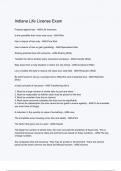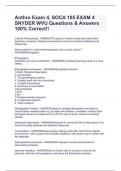Exam (elaborations)
Indiana Life License Exam (1). Questions & 100% Verified Correct Answers with complete solutions (Latest update
- Module
- Institution
Indiana Life License Exam (1). Questions & 100% Verified Correct Answers with complete solutions (Latest update
[Show more]




